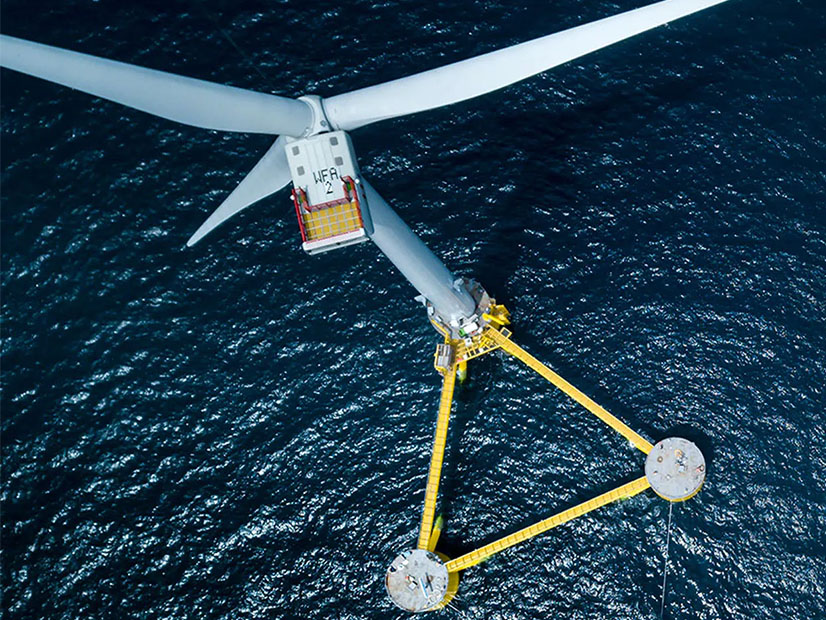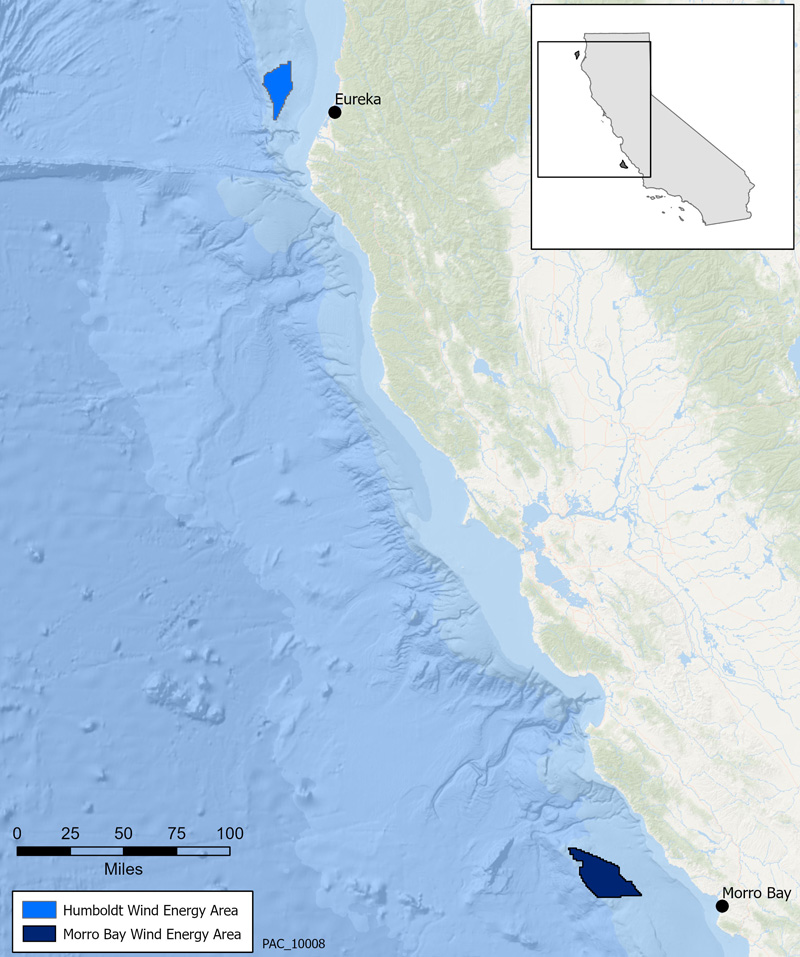
The federal Bureau of Ocean Energy Management issued a proposed sale notice Thursday for five lease areas off the California coast, taking a major step toward anticipated auctions later this year and the development of the first offshore wind farms on the West Coast.
Two of the proposed lease areas in the proposed sale notice (PSN) are in the Humboldt Wind Energy Area off the coast of Northern California, near the city of Eureka. Three are in the Morro Bay Wind Energy Area off the Coast of Central California, about halfway between Los Angeles and San Francisco.
Together, the wind energy areas (WEAs) cover 583 square miles and have the potential to generate at least 4.5 GW of electricity, enough to power 1.5 million homes.
“The proposed lease areas include the entirety of the Humboldt and Morro Bay WEAs,” BOEM said on its California webpage. “The WEAs were subdivided so that each proposed lease area is of roughly equal power generation potential and geographical size [and] is delineated in a manner to maximize energy generation.”
The areas were also designed to facilitate a fair return to the federal government through competitive bidding, it said.
BOEM based the lease area boundaries on the findings of a study published in April by the National Renewable Energy Laboratory that assessed the Humboldt and Morro Bay WEAs.
 BOEM plans to auction areas of the Humboldt Wind Energy Area off Northern California and the Morro Bay Wind Energy Area off Central California this fall. | BOEM
BOEM plans to auction areas of the Humboldt Wind Energy Area off Northern California and the Morro Bay Wind Energy Area off Central California this fall. | BOEMTrade groups reacted favorably Thursday to the news that BOEM has issued its PSN.
“By issuing today’s proposed sales notice and staying on track for an auction in the fall, BOEM is showing that it’s serious about advancing floating offshore,” Adam Stern, executive director of Offshore Wind California said in a statement.
The effort will “drive economies of scale and [help to] realize the very substantial clean power, climate and jobs benefits that offshore wind can deliver for our state and the nation,” Stern said.
The Business Network for Offshore Wind said the move represents a “step forward in the development of the next generation of offshore wind technology” because ocean depths off California require floating turbines, not the stationary units installed off the East Coast.
“Floating markets are advancing quickly in Asia and Europe, creating a race to develop our own capabilities and position the U.S. as a global leader in this cutting-edge market,” Business Network CEO Liz Burdock said in a statement.
“The Business Network congratulates President [Joe] Biden’s and [California] Governor [Gavin] Newsom’s administrations for this historic moment bringing offshore wind to the world’s fifth largest economy and taking necessary steps to set up a robust supply chain of domestic businesses that will elevate America as a frontrunner to an in-demand technology.”
Seeking Feedback
Planning efforts for port development, transmission and other key infrastructure are underway at the California Energy Commission and CAISO. (See California Port to Start OSW Upgrades and CAISO Sees $30B Need for Tx Development.) Experts, however, have expressed concerns that those efforts could lag development plans. (See West Coast Wind Faces Big Challenges.)
At the Pacific Offshore Wind Summit in San Francisco in late March, BOEM Director Amanda Lefton said the West Coast’s first offshore lease auctions would be held later this year for the Humboldt and Morro Bay WEAs. Her announcement prompted spontaneous applause from audience members, many of whom were wind developers.
“Let me be clear,” Lefton said. “We are going to hold a statewide offshore wind energy lease sale in California this year. The sale will offer up wind energy areas in the northern and central coasts, and these areas will enable the buildout of significant new domestic clean energy over the next decade or more. This will also help California reach its carbon-free energy goal by 2045.”
California Senate Bill 100 requires the state’s utilities to supply retail customers with 100% clean energy by 2045. The state’s offshore wind plans are part of the Biden administration’s national goal to develop 30 GW of offshore wind by 2030.
At the summit, Lefton also announced BOEM’s intent to issue a proposed sale notice, saying it would provide a “first look at the [proposed] lease terms and will ask for feedback on important initiatives for … labor agreements, credits for domestic supply chain investments, engagement with tribal nations and ocean users, and working with the commercial fishing industry.”
The PSN includes a request for feedback from stakeholders within 60 days. A final sale notice (FSN) must be issued at least 30 days prior to BOEM holding lease auctions.
“The designation of final lease areas in the FSN will be informed by comments received in this PSN and other relevant data,” BOEM said in its proposed sale notice.
In the meantime, BOEM is scheduled to hold the fifth meeting of its California Intergovernmental Renewable Energy Task Force on June 3. The “half-day virtual meeting will provide updates on offshore wind energy activities and discuss next steps in the BOEM authorization process,” BOEM said.


